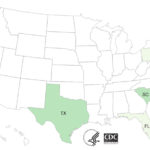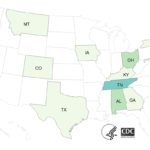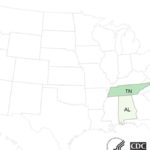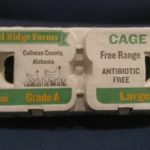An Almark Foods hard boiled eggs Listeria monocytogenes outbreak has sickened seven people in five states, according to the CDC. Four of the seven people sickened have been hospitalized, and one death has been reported in Texas. The bulk, fresh hard-boiled eggs produced by Almark Foods of Gainesville, Georgia are suspected intros outbreak. The case count by state is: Florida (1), Maine (1), Pennsylvania (1), South Carolina (2), and Texas (2). Listeria specimens were collected from ill people from April 10, 2017 to November 12, 2019. The patient age range is from less than 1 to 72, with a median age of 75. One illness was reported in a newborn who was infected with Listeria while the mother was pregnant, but the newborn survived. Of the five people who were interviewed by … [Read more...]
Eggs Suspected in Salmonella Outbreak at Grille at Gold Dust West
The Salmonella outbreak that is associated with the Grille at Gold Dust West restaurant in Elko, Nevada is still under investigation. At least seventeen people are sick in that outbreak, according to news reports. Now, eggs seem to be the focus of the investigation. Several news outlets state that the Nevada health department has asked the restaurant to remove eggs from its menu. The investigation of other menu items continues. Lab tests on the eggs and other foods are due next week. Eggs have been the source of Salmonella outbreaks for years. Most recently, a 2018 Salmonella Enteritidis outbreak linked to recalled Gravel Ridge Farms shell eggs sickened 44 people in 11 states. Twelve people were hospitalized in that outbreak because they were so seriously ill. Another outbreak, … [Read more...]
Gravel Ridge Farms Egg Salmonella Outbreak Details in FDA Warning Letter
The Gravel Ridge Farms shell egg Salmonella outbreak sickened 45 people in 12 states last year. The FDA sent the owners of that facility a warning letter on February 12, 2019, that gives us more information about the issues at the farm. Gravel Ridge Farms recalled more than 600,000 shell eggs in response to this outbreak. First, the final update by the CDC stated that 44 people were sickened in that outbreak. This warning letter adds one more person. The patients were sickend with the same outbreak strain of Salmonella Enteriditis that was found in the company's Cullman, Alabama location in egg laying houses No. 2 and No. 4. The isolates were genetically identical isolates taken from patients. Inspections revealed that the firm was in violation of the FDA's egg safety rule. The … [Read more...]
CDC Warns Against Eating Raw Dough
Warnings against eating raw dough have been issued by the Centers for Disease Control and Prevention. The holiday season is when most people bake sweets, and eating raw dough and batter is a fun thing to do. But it can make you very sick. People also often make doughs for crafts, such as making Christmas ornaments. Never use raw flour for those projects. There's a special warning, too, about the Salmonella outbreak that is linked to Duncan Hines cake mixes. Check your pantry to see if you have any of these recalled cake mixes. If you do, throw them away. The problem ingredients in cookie doughs and cake batters are eggs and flour. Eggs are often contaminated with Salmonella bacteria. And flour has been linked to E. coli outbreaks in the past. Flour is a raw agricultural … [Read more...]
Gravel Ridge Farms Shell Eggs Salmonella Enteritidis Outbreak Ends; Some May Sue
The Salmonella Enteritidis outbreak that is linked to recalled Gravel Ridge Farms shell eggs has ended with 44 people sick in 11 states, according to the Centers for Disease Control and Prevention. Twelve people in this outbreak were hospitalized because their illnesses were so serious. The case count by state is: Alabama (7), Colorado (1), Georgia (1), Iowa (1), Kentucky (1), Maryland (1), Montana (1), New York (1), Ohio (4), Tennessee (25), and Texas (1). The patient age range is from one year to 94. Of 378 people interviewed, 12 were hospitalized, for a rate of 32%. That's high for a Salmonella outbreak; the typical hospitalization rate for this illness is about 20%. Gravel Ridge Farms recalled their cage-free large eggs with use-by dates from July 25 through October 3, 2018. … [Read more...]
Lawyer Asks Where Were Gravel Ridge Farms Eggs Linked to Salmonella Outbreak Sold?
Food safety attorney Fred Pritzker wants to know where the cage free shell eggs from Gravel Ridge Farms that are linked to a Salmonella Enteritidis outbreak were sold. "We know that most of those sickened ate the eggs at restaurants. But we don't know the names of those restaurants or where they were located," he said. The Alabama Department of Public Health states that a gastrointestinal outbreak occurred among people who attended a catered event on July 30, 2018. Two of those sickened have confirmed Salmonella Enteritidis infections. The press release from Alabama also states that "Individuals who consumed an undercooked food item made with eggs were almost four times more likely to become ill than those who did not consume the food." The press release also states, "Most of those … [Read more...]
Salmonella Outbreak Linked to Gravel Ridge Farms Eggs Sickens 14 in 2 States; Lawsuits May Be Filed
A Salmonella Enteritidis outbreak linked to recalled Gravel Ridge Farms eggs (cage free) has sickened at least 14 people in two states. Two people have been hospitalized because they are so sick. Twelve people are sick in Tennessee, and two people in Alabama are ill. The recall notice was posted on the FDA website today. The recalled product is cage-free large eggs in packages of a dozen and 2.5 dozen. The recalled eggs have "best if used by" dates of July 25, 21018 through October 3, 2018, although the notice states that consumers should "Return any Gravel Ridge Farms eggs to the store for a refund or throw them away, regardless of the “best if used by” date." The CDC notice tells consumers to then wash and sanitize drawers and shelves in your refrigerator where the eggs were … [Read more...]
Salmonella Outbreak Linked to Recalled Gravel Ridge Farms Eggs in AL, GA, TN
A Salmonella outbreak has been announced in a recall of Gravel Ridge Farms Cage Free Large Eggs by the FDA. The announcement did not state the number of people sickened, where they live, age ranges, or if anyone was hospitalized. The firm was notified by the FDA on September 6, 2018 that their eggs may be contaminated with Salmonella. The recalled product is Gravel Ridge Farms Large Cage Free Eggs, in single dozen and 2.5 dozen flats. The UPC on the product is 7-06970-38444-6, and the use-by dates on the eggs are 7/25/18 though 10/3/18. The eggs were sold between 6/25/2018 and 9/6/6/2018. The eggs were sold mostly in restaurants and retail stores in Alabama, Georgia, and Tennessee. In Atlanta, these stores carried the eggs: Candler Park Market, Grant Park Market, Westview Corner … [Read more...]
Multistate Outbreak of Salmonella Braenderup Linked to Rose Acre Farms Shell Eggs Is Over
The multistate outbreak of Salmonella Braenderup infections linked to recalled Rose Acre Farms shell eggs is over, according to the CDC. Forty-five people in 10 states were infected with the outbreak strain. Eleven people were hospitalized. No deaths were reported. Epidemiologic, laboratory, and traceback evidence indicated that shell eggs produced by Rose Acre Farms' Hyde County, North Carolina farm were the likely source of this outbreak. Rose Acre Farms voluntarily recalled 206,749,248 shell eggs on April 13, 2018. On April 16, 2018, Cal-Maine Foods voluntarily recalled another 23,400 dozen eggs that were purchased from Rose Acre Farms. The patient case count by state is: Alaska (1), Colorado (1), Florida (2), New Jersey (2), New York (14), North Carolina (6), Pennsylvania … [Read more...]












